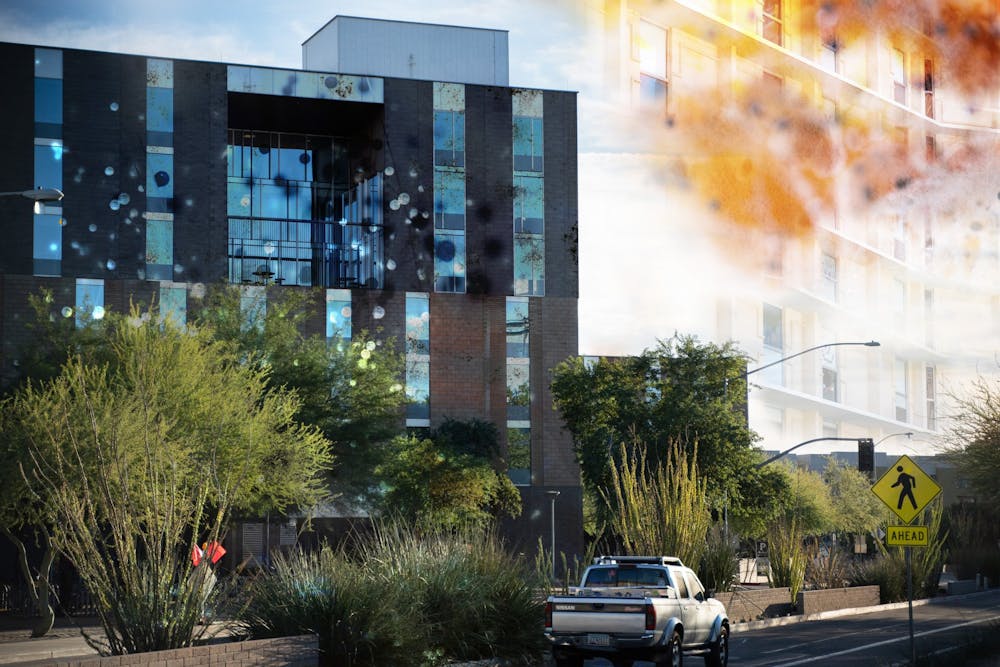From news articles to word of mouth, it has become widely known there is a concern about mold in ASU housing. It seems as though the University is not taking enough precautionary measures to ensure student safety.
On-campus students should have legal protection regarding housing, which would leave the University more accountable for student health concerns.
The story gained attention from an ABC15 interview with a student's parents and their outcry for ASU to control mold levels that allegedly made their daughter sick. With pictures and expert opinion, it seems fairly obvious that mold levels were growing "over the minimum amount," according to Cheri Dersam, a physician at Integrative Medicine of Arizona who was interviewed by ABC15.
Multiple Reddit users expressed the story told by the parents was not the only case of mold concerns. These complaints should not be taken lightly, especially considering people are skeptical of mold in Vista del Sol, Palo Verde West and Hassayampa.
Ethan Long, a first-year student studying digital and integrated marketing communications, moved into the Hassayampa dorms in the fall. "I was sick two days after moving in and on and off throughout the time I lived in the dorm full-time," he said.
Both he and his roommate noticed "an odd smell upon move-in," which has caused him to avoid on-campus living as much as possible. Although he has the ability to live off-campus with his parents, ASU houses many international and out-of-state students who do not have the same opportunities.
So, why isn't ASU truly doing anything about the issue?
In a statement to ABC15, the University said it conducted "an indoor environmental quality assessment" in November 2021 concluding the air quality in the residence halls was normal. However, this did not match the test results from a urinalysis of the ill student in the article.
Along with this investigation, it was noted that "(The city of Tempe) Code Enforcement does not perform interior inspections on ASU property." ASU housing agreements state the relationship existing between students and University housing "is that of licensor and licensee, and NOT that of landlord and tenant." The explicit statement of the licensor-licensee agreement suggests that there are different protections within this relationship that differ from a landlord-tenant relationship.
ASU does not seem to have written regulation in place to condemn the presence of mold in University housing. This seems very odd considering that Tempe apartments have had their fair share of mold concerns, so it is not uncommon in the area.
From research and ASU spokespeople, it is unclear what rights students do have in this licensor and licensee relationship. To make students feel secure, the University needs to accommodate on-campus residents with a written set of liabilities and protection rights, specifically regarding health.
"Since the start of the 2021 school year, ASU has found no evidence of significant mold growth in the ventilation system of any residential hall," an ASU spokesperson said in an emailed statement. "ASU maintenance staff clean vents and replace air filters frequently throughout the year to help reduce dirt and dust in the air system."
After asking questions regarding protections and inspections, the University gave no response and simply restated its case that mold should not be of concern. To me, this seems as though the University either has no protections in place or is trying to cover its back against civil suits and cases.
Apart from mold, ASU's Downtown Phoenix campus has residents of Roosevelt Point reporting rat infestations in the building. It is clear that the University is not keeping its housing up to reasonable health standards and needs to be making legal reforms for student safety and its own liability.
ABOR has not yet publicly addressed the problem, and it is clear that even throughout the two meetings that have already occurred in 2022, the Research and Health Sciences Committee does not even acknowledge the issue.
Overall, ASU’s lack of acknowledgment of the mold affecting student health shows that the University would rather uphold its reputation than genuinely help the students.
Reach the reporter at cijennin@asu.edu.
Editor's note: The opinions presented in this column are the author's and do not imply any endorsement from The State Press or its editors.
Want to join the conversation? Send an email to opiniondesk.statepress@gmail.com. Keep letters under 500 words and be sure to include your university affiliation. Anonymity will not be granted.
Like The State Press on Facebook and follow @statepress on Twitter.




